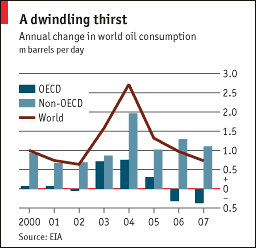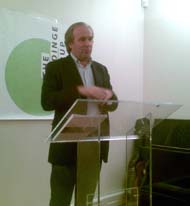 [Cross-posted] One theme that has been emerging—or I am reading way too much into it—is institutionalization. In the casual posts I put on to my personal blog over at Vox, the theme has come up a couple of times: once in a post about oil consumption dropping (really—see graph at left), and once in the Yale Class of 2008 speech from the Rt Hon Tony Blair.
[Cross-posted] One theme that has been emerging—or I am reading way too much into it—is institutionalization. In the casual posts I put on to my personal blog over at Vox, the theme has come up a couple of times: once in a post about oil consumption dropping (really—see graph at left), and once in the Yale Class of 2008 speech from the Rt Hon Tony Blair.
Some of us look at large organizations such as the UN and see not an effective group of people, but an impotent gathering bogged down in internal politics. Political parties themselves, once they are too big, seem to exhibit the same behaviour—watch as the New Zealand Greens are beginning to duke it out internally now. The institutionalization that is apparent in the media also gives rise to reporting sloppiness as journalists target sensationalism ahead of truth.
We have institutions to blame for this, just as we might point to other institutions that are keeping the human race from progressing in other spheres. They are geared to pro?t, not social responsibility—and that money can only be squeezed, at least in the western world, from private citizens.
It’s why there is some wisdom out there that points to small groups being more effective given so many inhumane organizations. We then come to the theme that the internet is a great equalizer and leveller in allowing those groups to emerge.
I would like to partly counter that by saying that large institutions can be run effectively if the core, the vision and the strategy are properly directed, either to service the public or some great cause.
Corruption and a lack of education are the enemies of these institutions, just as they are the enemies of a successful nation.
Richard Branson’s Virgin empire is an effective example of a good brand, because of its underdog position. This approach sees its staff adopt a ‘We try harder’ approach that one might associate with Avis. And it should be noted that it once worked for Avis, too.
Success breeds growth, which may explain why in some organizations, the rot sets in after a while. Virgin has been fortunate in some respects. But it has also been very skilful at choosing people with the right mindset. Others have been less fortunate, and we see the decay come in—and allegations of corruption made, such as against the UN.
We should always be vigilant, not just among ourselves but checking the companies we buy from or the institutions we support.
May I quote Mr Blair: ‘The world in which you, in time to come, will take the reins, cannot afford a return to twentieth-century struggles for hegemony.’
Hegemony is the worst form of institutionalization. It emerges because we, as humans, haven’t discovered how to get on, preferring to be superior to someone than allowing both parties to be equally happy. Earlier in the same speech, Mr Blair said:
A few days before that, I was in Jericho. If you look up from the town centre, to the left is the Mount of Temptation, where Jesus stayed 40 days and nights. To the right, you can see Mount Nebo where Moses looked down on the Promised Land. And right in front of you is the Valley of Jordan.
My guide, a Muslim, turned to me, and said, ‘Moses, Jesus, Muhammad—why in God’s name did they all have to come here?’
But in God’s name, they came, and for centuries, their followers have waged war in the name of prophets whose life work was in pursuit of peace.
The core message—the vision—was corrupted by followers, in that quest for power, borne from ill education and small minds.
Hence so many organizations fail after their founders pass away—the great mind is gone, along with the direction, and the scavengers swarm.
And why, as individuals, we ultimately hold the power to group with like-minded citizens, forming small groups to do the things that need to be done for justice in this world.








